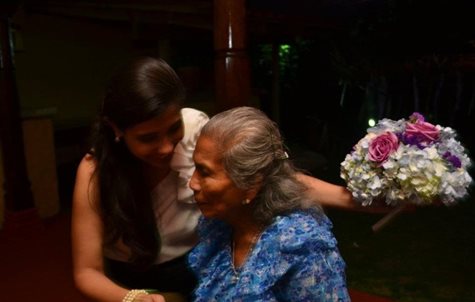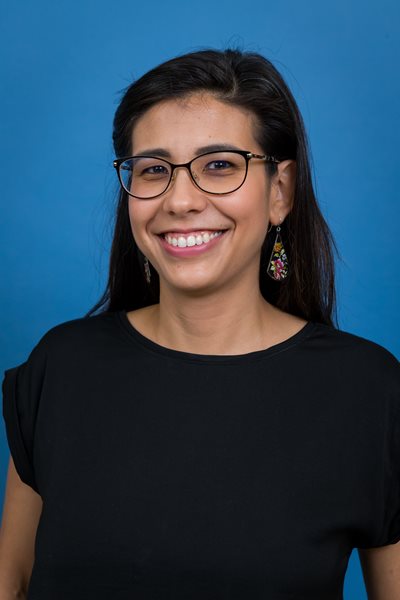
Triple Your Impact This Holiday Season
Triple Your Impact This Holiday Season
Celebrate the holidays with a year-end gift that can go 3x as far to help provide care and support to the millions affected by Alzheimer's disease, and to advance critical research. But please hurry — this 3x Match Challenge ends soon.
Donate NowNicaraguan Karen A. Dorsman is an Alzheimer’s disease researcher, community educator and doctoral candidate at the clinical psychology Ph.D. program at University of Texas Southwestern Medical Center (UTSW). We spoke with her about how her culture has influenced her work, and her hopes for the future of Alzheimer’s and dementia research.
How did Alzheimer’s disease research become your focus?
When finishing my undergraduate degree in Uruguay, I got a job as a psychometrist, administering and scoring neuropsychological tests. This memory clinic assessed adults, most over the age of 50, and as I evaluated them, I became interested in talking to their families. It was through these conversations that I realized how much the person had changed in front of me, and as a result, how much the family dynamics changed as well. For example, people stopped enjoying activities that used to bring them joy such as cooking, or conversing after each meal, something Uruguayans call “sobremesa.”
I also saw that communities in cities adapted very differently from those in rural areas when it came to facing Alzheimer’s and other dementia. Some people regarded signs and symptoms of Alzheimer's disease as a part of normal aging, while other families had an awareness that this was not a normal part of aging. Today, much of what I learned during that work is why my research focuses on the environmental and sociocultural aspects of cognitive health.
 My family is another reason I got involved in the field. I lost my mother when I was 6 years old, and my father had the support of my grandma in helping raise me. I witnessed how my grandma changed over time, the result of atypical Alzheimer’s disease. By the time I was 15, Grandma’s behavioral differences were puzzling my family; they had thought forgetfulness was the main — or only — hallmark of Alzheimer’s disease. It was a learning curve for them to understand that Alzheimer’s and dementia behaviors like apathy weren’t my grandma. It was her disease, hard at work.
My family is another reason I got involved in the field. I lost my mother when I was 6 years old, and my father had the support of my grandma in helping raise me. I witnessed how my grandma changed over time, the result of atypical Alzheimer’s disease. By the time I was 15, Grandma’s behavioral differences were puzzling my family; they had thought forgetfulness was the main — or only — hallmark of Alzheimer’s disease. It was a learning curve for them to understand that Alzheimer’s and dementia behaviors like apathy weren’t my grandma. It was her disease, hard at work.
How has your culture influenced your path as a researcher?
I identify as part of a collectivist culture: that what we do in our family systems, neighborhoods and communities impacts others. My culture believes that your surroundings will impact the way you grow, and not only physically, but emotionally, intellectually, socially.
Every time I ponder an Alzheimer’s research question and work with a person living with the disease, I think about where the person lives, and who they connect with. This mentality has the biggest impact on my work. Moving from Nicaragua to Uruguay and then the Bay Area — engaging with people from all over Latin America — was an important piece of my path, because I experienced the heterogeneity within Latinx populations. I have seen how aging is regarded differently in different countries, or in different parts of the same country.
My hope for the field is that since we are all connected virtually, we will work to continue to learn from each other to collaborate and exchange skills, asking questions like: ‘What do you want to learn about how we approach differences in quality of education?’ I hope researchers will continue skill-sharing, because interdisciplinary research and collaboration are what is going to move us forward. That’s what I love about being a part of this field; engaging with researchers — like social epidemiologists — that I never would have met outside of this widening and growing field.
Tell us about your neuropsychology training and what is up next for you.
This year I started my internship in pediatric neuropsychology, which has been fascinating. The questions I ask related to health disparities in cognitive aging are very closely related to issues that appear earlier in life. I plan to absorb all the knowledge I can as I work with families facing neurodevelopmental disorder diagnosis in their children, determining which intervention therapies they have access to, and how we can improve access to care. The more we embrace the fact that disparities in aging are created early in life, the better chance we have to influence public health policies that will help our collective cognitive health overall.
 In addition to my research, I continue to focus on community education. I like to think of my work in the community as a two-way street: I teach what I have learned, but I am learning as well. It helps my research when I hear from people about topics like Alzheimer’s disease risk factors, and allows me to rephrase future research questionnaires that inform my work.
In addition to my research, I continue to focus on community education. I like to think of my work in the community as a two-way street: I teach what I have learned, but I am learning as well. It helps my research when I hear from people about topics like Alzheimer’s disease risk factors, and allows me to rephrase future research questionnaires that inform my work.
Looking ahead, I can’t wait to convene with my fellow researchers at scientific meetings, and to continue working to address access to health care as an issue of socioeconomics. I’m hopeful that there will be more funding to help understand the biological mechanisms through which those environmental and social factors affect the disease process. While it may not make a difference for someone living with Alzheimer's disease today, I know it will impact future generations of people living with disease, and their caregivers.
What are your hopes for the future of Alzheimer’s research?
I believe that our bodies keep a footprint of our cognitive, emotional and physical experiences throughout our lives, and that cognitive aging reflects that footprint. The more we learn about the risk factors for dementia, the more knowledge we will have to create and tailor public policies that will impact all of us.
Hispanic/Latino/x/e populations in the U.S. have very different backgrounds and lived experiences. The history of our colonization is so different, from South to North America, and nativity status and reasons for immigrating to the U.S. also vary. I want there to be a greater focus on heterogeneity and clinical diversity. Understanding that piece of the puzzle will be important to understanding migrant health data, because interventions that may work for a U.S. born person whose family immigrated from Nicaragua may not necessarily be the same approach needed for a Nicaraguan living in the U.S., or abroad.
Today, I see a lot of very passionate people — caregivers, researchers, volunteers — coming together around one goal, a world without Alzheimer’s disease. This disease doesn’t affect just one person, or one community — it affects us all. The better we use our skills and knowledge to work together to understand the causes behind Alzheimer’s disease, the more we can do in this fight moving forward. That is my greatest hope — progress for all of those families who have been affected.
About: Born and raised in a large family in Nicaragua, Karen is currently a doctoral candidate in clinical psychology with an emphasis in neuropsychology at UTSW. She is the student representative-elect for the Hispanic Neuropsychological Society and a dedicated mentor for students minoritized backgrounds. Passionate about community outreach, she’s also a community health educator and has experience curating conferences as a member of the committee for the Latinos & Alzheimer’s Symposium. Karen enjoys dancing Nicaraguan folklore, and walks with her dog, Coconut.
Related articles:
Volunteer
Research and Progress
